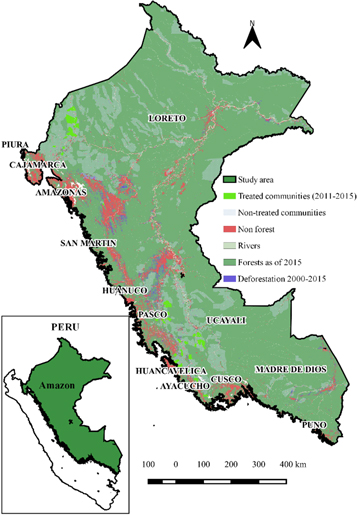Peru, on the other hand, is navigating the shackled man problem(1); that developed countries want the rest of the world to limit progress now that rich economies are already doing well. So in 2010 they launched a program to protect the rainforest but Europeans criticize that its effect is still too small. Further, they want Peru to enact three more stringent measures and if governments in Europe agree Peru has to at least consider it because they are held hostage by international governments funding the program.
Implementation of the outside conservation program naturally followed the path of least resistance. Areas that weren't utilized by farmers anyway were declared protection zones, which allowed economic progress to continue, and that segmentation is what the new study wants to end. The Peruvian government has also been in no rush to punish violations. Though they caved in to western countries on paper they don't truly sympathize with them over native people trying to eke out a living. Those living in the rainforest have lived there since pre-history and are among the country's poorest, at least by our standards.

Study area showing non-forest (includes no forest classes such as savannah vegetation and deforested areas up to 2000), treated communities between 2011 and 2015, all other non-treated communities, rivers, primary forests as of 2015, and deforested areas between 2000 and 2015.
Given all that the new paper wants three things to change in Peru:
(1) Force natives to enroll their entire territory and not just certain parts.
(2) The government should penalize those who commit infractions more strongly.
(3) Redraw the lines of the preservation program to include communities that outside countries believe are the worst for the rainforest.
There are obvious flaws in the plan. On (1), many poor people would be in default from the beginning of the new plan because they have no political clout. In the US, no one forces farmers to give up their land so government can preserve it, the Obama administration even turned over 5 million acres of government land to corn farming because they loved ethanol regardless of its environmental impact. On (2), the choice for enforcement is either exclude indigenous people who refuse to abide by European rules or penalize them economically, when they are already the poorest in the country. (3) smacks of colonization because actual Peruvians drew up the original priority areas and now Europeans want to tell them to redo it because Europe didn't like that Peru did not submit their internal decisions for approval.
Europeans feel like they are right in this because the Amazon rainforest is a carbon storage sink and important for global water cycles, but if forests were so important to Europeans, they wouldn't exempt their own wood burning for energy from their emissions numbers while penalizing the countries they import the wood from.
Citation: Renzo Giudice, Jan Börner, Sven Wunder and Elias Cisneros, ,Selection biases and spillovers from collective conservation incentives in the Peruvian Amazon,, Environ. Res. Lett. (2019), https://doi.org/10.1088/1748-9326/aafc83
NOTE:
(1) At the start of a race, one participant has their feet shackled. After 100 yards, the other participant benevolently agrees to have the opponent's shackles removed while the relative progress remains static, forgetting that their competitor will have a harder time catching up even though they are now "equal." The leader then declares their continued position to be the result of superior initiative.





Comments